Where Do Blue Iguanas Live Are Ther Predators for Blue Iguana


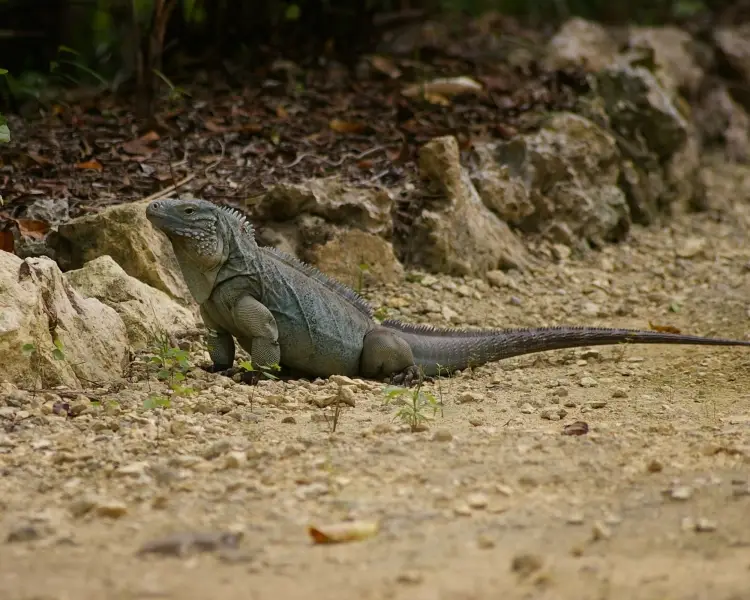
Blue Iguana
Grand Cayman ground iguana, Grand Cayman blue iguana, Cayman Island rock iguana
The Blue iguana is an endangered species of lizard that is native to the island of Grand Cayman. This large lizard has articulated toes that are efficient in digging and climbing trees. The mature male's skin color ranges from dark grey to turquoise blue, whereas the female is more olive green to pale blue. Young animals tend to be uniformly dark brown or green with faint darker banding. Adults change their color to blue when they are in the presence of other iguanas to signal and establish territory. The blue color is more pronounced in males of the species. Males are also larger and have more prominent dorsal crests as well as larger femoral pores on their thighs, which are used to release pheromones.
Photos with Blue Iguana
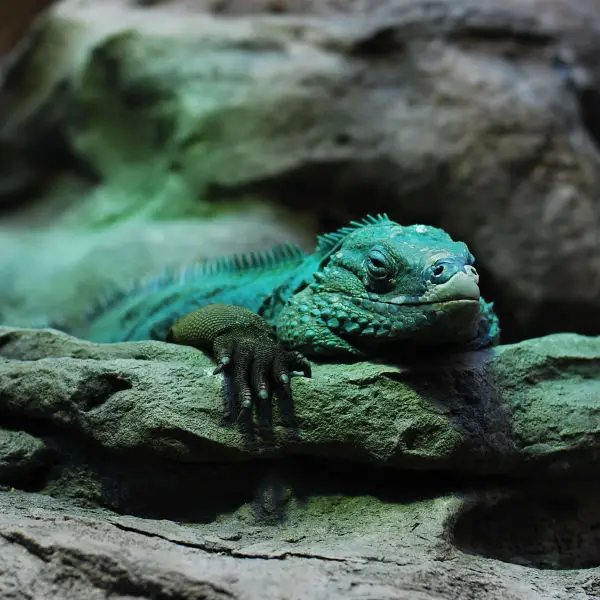
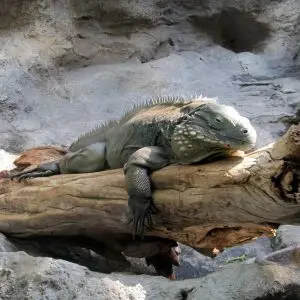
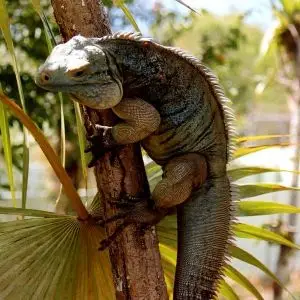
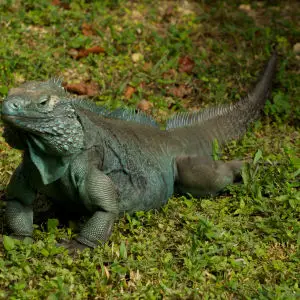
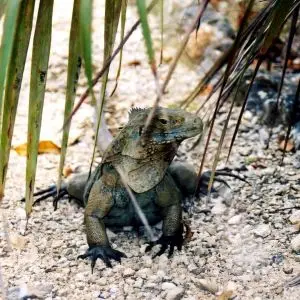
View 15 more photos of Blue Iguana
Distribution
Geography
Blue iguanas can be found throughout the island Grand Cayman excluding the urban areas of Bodden Town, Gun Bay, Seven Mile Beach, and West Bay. They now only occur inland in natural xerophytic shrubland and prefer rocky, sunlit, open areas in dry forests or near the shore. They can also be found along the interfaces between farm clearings, roads, and gardens.

Biome
Climate zones
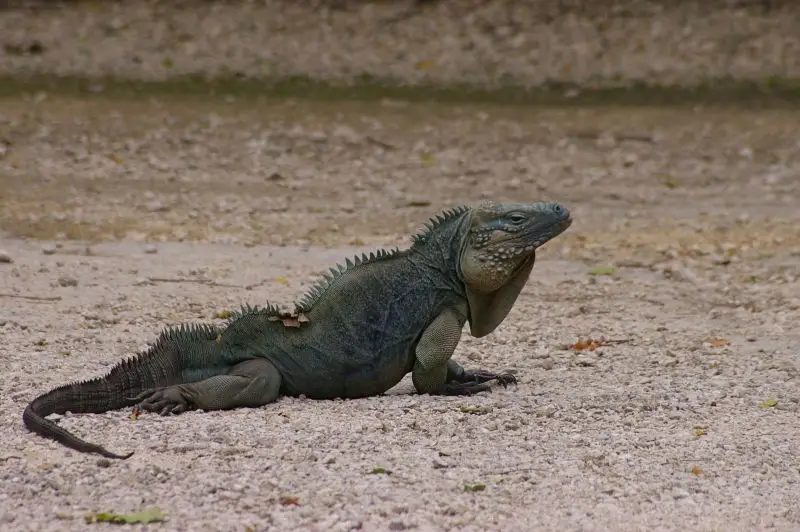
Habits and Lifestyle
Blue iguanas are solitary creatures and come together only to breed. They are active during the day and sleep at night in rock holes and tree cavities. As adults Blue iguanas are primarily terrestrial although they may climb trees 15 feet (4.6 m) and higher. Younger individuals tend to be more arboreal.
Diet and Nutrition
Blue iguanas are herbivorous (folivorous, frugivorous). They consume leaves, flowers, and various fruits. They may very rarely eat insects, crabs, slugs, and fungi.
Mating Habits
Blue iguanas breed from May through June. The male courts the female by numerous head-bobs and then he circles around behind the female and grasps the nape of her neck. About 40 days after mating the female excavates a nest in pockets of earth exposed to the sun and lays there a clutch of anywhere from 1 to 21 eggs, usually in June or July. The temperature within nests that have been monitored by researchers remained a constant 32 °C (90 °F) throughout the incubation period which ranges from 65-90 days. The young are aggressively territorial from the age of about 3 months onward. They typically reach reproductive maturity after 4 years of age in captivity.
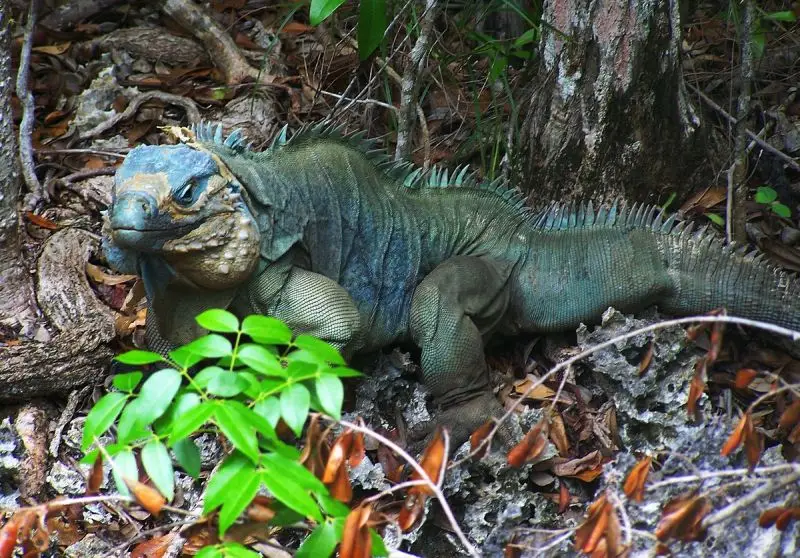
Population
Population threats
The Blue iguana was possibly abundant before European colonization, however, by 2003 fewer than 15 animals remained in the wild; this wild population was predicted to become extinct within the first decade of the 21st century. Habitat destruction is the main factor threatening extinction for this iguana. Land clearance within a remnant habitat is occurring for agriculture, road construction, and real estate development and speculation. The conversion of traditional crop lands to cattle pasture is eliminating secondary Blue iguana habitat. Predation and injury to hatchlings by rats, to hatchlings and sub-adults by feral cats, and killing of adults by pet dogs are all placing severe pressure on the remaining wild population. Automobiles and motorscooters are another increasing cause of mortality as the iguanas rarely survive the collisions.
Population number
According to the IUCN Red List, the total population size of the Blue iguana is 443 mature individuals. Currently, this species is classified as Endangered (EN) on the IUCN Red List but its numbers today are increasing.
Fun Facts for Kids
- The Blue iguana is one of the longest-living species of lizard.
- The closest relatives of the Blue iguana are the Cuban iguana and the Northern Bahamian rock iguana.
- The name "blue iguana" is also used for bright blue forms of the Green iguana.
- The Blue iguana is among the largest species of lizard in the Western Hemisphere.
- Blue iguanas have red eyes adapted to protect the pupils from the sun's glare.
- The Blue iguana's eggs are among the largest laid by any lizard.
- In 2006 the Blue iguana was one of the most endangered lizards on Earth.
References
More Fascinating Animals to Learn About
Source: https://animalia.bio/blue-iguana
0 Response to "Where Do Blue Iguanas Live Are Ther Predators for Blue Iguana"
Post a Comment